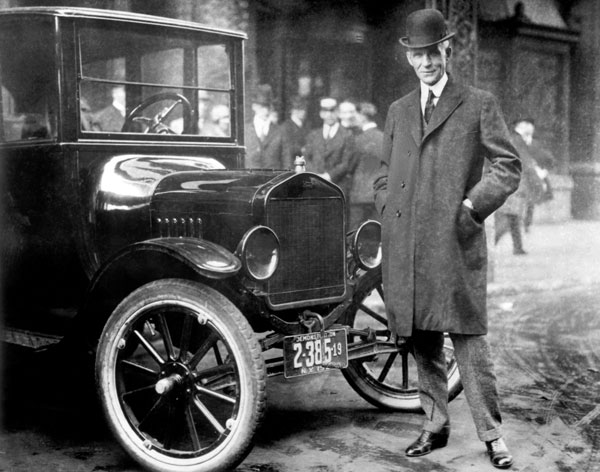HENRY FORD: THE INTERNATIONAL JEW
To many of us, Henry Ford represents what was good about small town America. He believed in the common man and a simple life of hard work, discipline, and helping your neighbors. Some thought of him as a “prophet of proper living” who practiced what he preached. He rose at dawn every morning, exercised daily, did not smoke or drink and believed there was a direct correlation between hard work and success. He was also restless and driven and described by some as more mechanical than emotional.
From an early age, it was obvious Henry was a mechanical genius. He also had a great entrepreneurial spirit and hung around with the likes of Thomas Edison and Harvey Firestone. More than anything, he wanted to transform the lives of the ordinary citizen and give them the mobility he had longed for during the years he grew up on a farm. It was his dream to create a car that every American could afford.
A pioneer of welfare capitalism, Henry Ford wanted to improve the life of his workers but also wanted efficient and dedicated employees with little turnover. He also believed that all his immigrant employees (from 50+ countries) should have a strong command of English and required them to attend daily lessons of a practical nature. When they “graduated” from Ford’s English School, a ceremony took place where they had to dress in their native costume, climb into a huge “melting pot” and be subsequently stirred by their teachers. They then emerged dressed in a suit, wearing a straw hat, and waving an American flag.
Not only did Ford want his employees to embrace the American culture, he believed he could help them live a “better” life. What soon became known as “social engineering”, inspectors from the company were sent out to check out the lifestyle of his employees. Landlords, neighbors and friends were interviewed to find out about their private lives, including the status of their relationships, the cleanliness of their home, whether they drank or not, and whether they sent money home to their native country. Those who “failed” the inspection were given one chance to change their ways. If they failed a second time, they were fired.
Always at odds with his investors, Ford made it clear that he represented the common man and had no respect for the social elite. He referred to his investors as “parasites” because they put money in but didn’t do anything to make the company grow. In 1920, he started writing articles for the Dearborn Independent where he linked the investment world to the Jewish population. Entitled “The International Jew”, these writings accused Jews of being business profiteers who cheated, manipulated and controlled Wall Street and the entire banking industry. A pacifist, Henry also believed that it was the international banking investors who had financed World War I. He wrote that Jews were “the scavengers” of the world and a problem for everyone, not just Americans. By 1926, circulation of these articles had reached 900,000, and the entire country was talking about his writings.
Although he was condemned by The American Jewish Committee, the Federal Council of Churches, many influential leaders (including President Woodrow Wilson), Ford refused to back down. It wasn’t until many defamation lawsuits later (and a drop in car sales) that Henry was finally persuaded to shut down the Dearborn Independent in 1928. Unfortunately, by that time, the damage was done and the entire world had heard the viewpoint of this very influential and well-respected American industrialist. Copies of the articles had reached Germany by 1924, and, in a letter written by Heinrich Himmler, Ford was described as “one of our most valuable, important, and witty fighters.” Also, Adolf Hitler, who worshiped Henry Ford and kept a life size portrait of him next to his desk, declared in 1931 that he was inspired by him and wanted to model the Volkswagen (i.e. Germany’s version of the people’s car) after the Model T. In 1938, Ford received the award of the Grand Cross of the German Eagle, the most prestigious medal Nazi Germany could bestow on a non-German. He was also referred to in the Nuremberg trials as having influenced several Nazi leaders.
While unimaginable atrocities were occurring in Europe in the 1930’s and 1940’s, a reign of terror, threats and violence was also going on inside Henry Ford’s plant. By that time, the Ford River Rouge was one of the largest and most sophisticated plants in the world with the sole purpose of turning out as many cars as possible at the cheapest cost and in the shortest amount of time. It became a heartless work environment with unrealistic expectations, no concern for the individual worker, no team work and no camaraderie. Harry Bennett, a former ex-boxer and Navy sailor, was Head of the Service Department and also responsible for keeping the labor unions powerless. He and his assistants, who consisted of street fighters and ex-convicts, patrolled the factory with their weapons displayed, controlling every aspect of the employee’s life. No talking was allowed, and workers who associated with the union were severely beaten.
Henry Ford was MANY things to different people. To some, he represented everything that was good about America, like the Statue of Liberty, Norman Rockwell or apple pie. He was a rags to riches story. To others, he was one of the greatest inventors of the 20th century, an industrialist that revolutionized society and upgraded the lives of many. To those who worked with him, including his son Edsel, Ford was a controlling, paranoid perfectionist who bullied and humiliated those who didn’t follow his ideas or prescribed way of life. You were either a worshipper or a traitor, it was that simple. But to many people, he will only be remembered as a man whose hatred for a race contributed to the largest genocide that has ever occurred.
Copyright © 2013 (Michelle Parsons, Getting Back on Your Path). All Rights Reserved.

